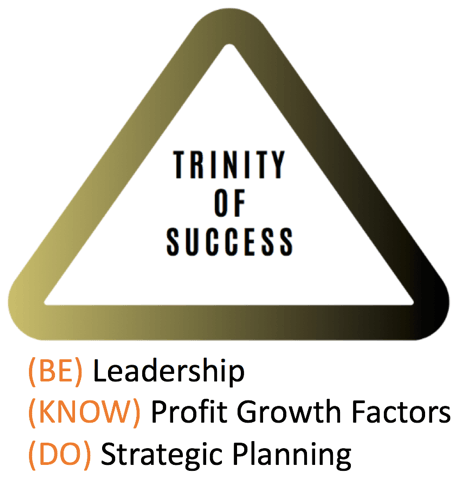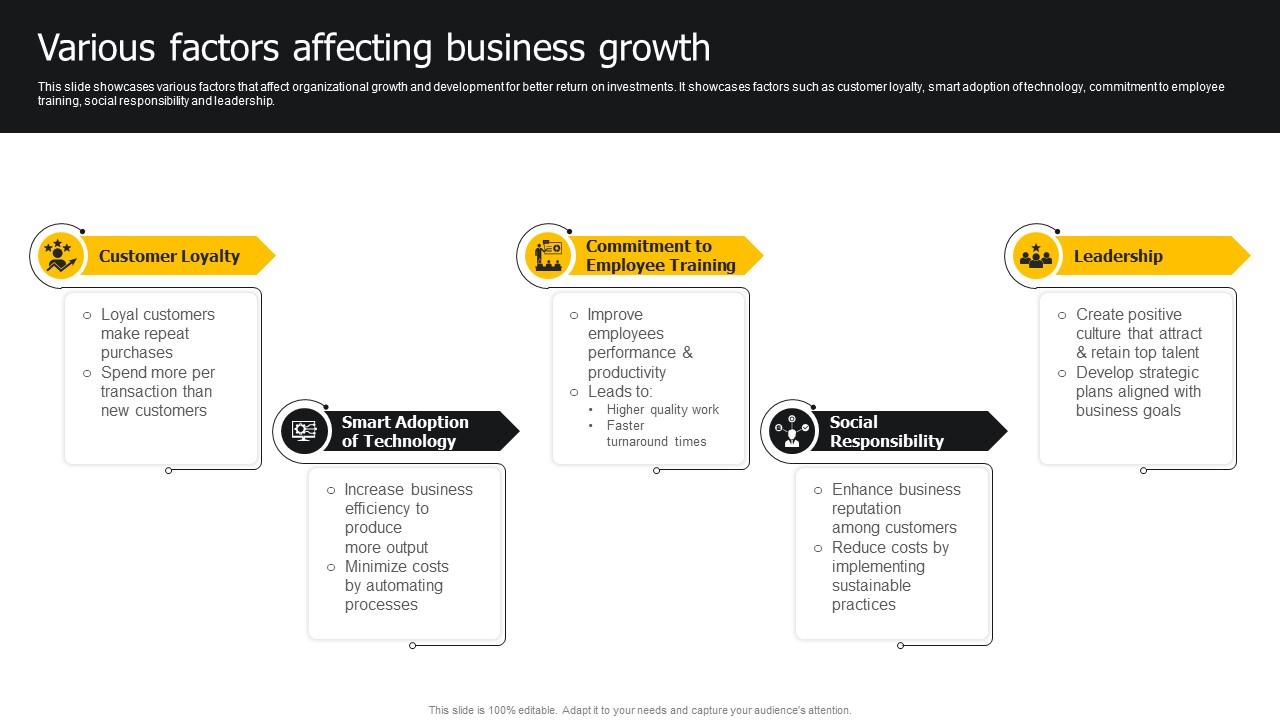The Business Growth Factor refers to the specific elements that contribute to the constant and steady growth of a business, such as effective management, a strong online presence, credibility, openness to new ideas, and clear articulation of goals. These factors ensure that the business structure and management are aligned with the goal of growth, while also fostering customer loyalty, increasing profits, and meeting market demands.
Additionally, factors such as financial assets, leadership, marketing strategies, and organizational structure play a crucial role in driving business growth. Understanding and implementing these growth factors can guide businesses in achieving their ambitions and reaching new levels of success.
Understanding Business Growth Factors
Understanding business growth factors is crucial for sustained success. Factors such as effective business management, strong online presence, clear goals, and openness to new ideas contribute to steady growth. These ingredients, along with management experience, functional skills, and knowledge of the relevant business sector, form the recipe for business growth.
Definition Of Business Growth Factors
Business growth factors refer to the various elements that contribute to the expansion and success of a business. These factors can include both internal and external elements that impact the overall growth and development of a company. Understanding and effectively managing these growth factors is crucial for long-term sustainability and profitability.
Importance Of Business Structure And Management
An efficient and well-defined business structure plays a vital role in driving growth and success. It provides an organized framework for operations, ensuring smooth functionality and coordination within the company. A unique and market-driven business structure helps in distinguishing a company from its competitors, enabling it to gain a competitive advantage. Effective management ensures that resources are allocated properly, goals are set and achieved, and risks are mitigated.
Some key aspects of business structure and management that contribute to growth include:
- Clear Articulation of Goals: Clearly defining and communicating the business’s short-term and long-term goals helps align efforts towards achieving them.
- Organizational Structure: Establishing a well-defined organizational structure allows for smoother workflow, better accountability, and efficient decision-making.
- Commitment to Employee Training: Regular training and development opportunities enable employees to enhance their skills, leading to increased productivity and innovation.
- Openness to New Ideas: Encouraging a culture of innovation and open communication fosters creativity and keeps the business adaptable to changing market demands.
- Online Presence and Credibility: In today’s digital world, having a strong online presence and credibility is essential for attracting customers and gaining a competitive edge.
By focusing on these aspects, businesses can enhance their growth potential and position themselves for long-term success.

Credit: www.strategicadvisorboard.com
Factors Influencing Business Growth
Factors influencing business growth include management experience, family history, functional skills, and knowledge of the relevant business sector. Other important factors include business structure, online presence, credibility, openness to new ideas, and clear articulation of goals. These elements contribute to a business’s constant and steady growth.
When it comes to business growth, several factors play a crucial role in determining the success of a company. These factors can vary from management experience to functional skills. Understanding these factors and leveraging them effectively can propel a business to new heights. Below, we explore some of the key factors that influence business growth.
Management Experience
Effective management is at the heart of a successful business. The experience and expertise of the management team can significantly impact the growth of a company. Managers with a strong track record in leading and scaling businesses tend to make better decisions and navigate challenges more effectively. Their ability to strategize, allocate resources wisely, and adapt to changing market conditions can contribute to sustained growth.
Family History
In some cases, family history can influence business growth. Family-owned businesses often benefit from the knowledge, values, and traditions passed down through generations. This history can provide a strong foundation and a deep understanding of the industry, customer base, and market dynamics. Moreover, the commitment and unity within the family can foster long-term vision and stability, contributing to business growth.
Functional Skills
Functional skills are another critical factor influencing business growth. A company needs individuals with diverse skill sets to drive growth in various departments such as finance, marketing, operations, and sales. These skills enable businesses to effectively manage their operations, develop marketing strategies, streamline processes, and deliver high-quality products or services. The combination of expertise in different areas is vital for sustainable growth.
Relevant Business Sector Knowledge
In today’s competitive landscape, having sector-specific knowledge is essential for business growth. Understanding industry trends, customer behavior, market dynamics, and emerging technologies can provide a competitive advantage. This knowledge allows businesses to identify opportunities, make informed decisions, and stay ahead of the curve. Keeping up with the latest advancements and industry developments is crucial to remain relevant and drive growth in the respective business sector.
Indicators Of Business Growth
When it comes to measuring the success of your business, there are several key indicators that can give you insights into its growth potential. By regularly monitoring and analyzing these indicators, you can make informed decisions about the direction of your business.
Profit
Profit is a vital indicator of business growth. It represents the financial gain made after deducting all expenses from the total revenue. Monitoring and increasing profits can signify that your business is on the right track.
Revenue
Revenue is the total income generated by your business from its core activities. It is a fundamental indicator of business growth since increasing revenue signifies that your business is attracting more customers and generating more sales.
Market Share
Market share refers to the portion of the market that your business controls or competes for. It can be calculated by dividing your company’s sales by the total market sales. Increasing market share indicates that your business is gaining dominance and recognition within the industry.
Customer Satisfaction
Customer satisfaction is a crucial measure of how well your business is meeting the needs and expectations of its customers. Satisfied customers are more likely to become loyal and recommend your business to others, leading to increased customer retention and growth.
Demand
Demand represents the level of interest and desire for your products or services in the market. Monitoring and analyzing demand helps you understand the potential for growth and identify opportunities for expansion or diversification.
Summary
To summarize, profit, revenue, market share, customer satisfaction, and demand are all significant indicators of business growth. By regularly evaluating these indicators, your business can make informed decisions and take the necessary steps to achieve its growth ambitions.
Calculating Business Growth
Sure, I can help you with that. Here’s the response in HTML format suitable for WordPress: “`htmlUsing Current And Previous Period Values
Calculating business growth involves comparing the current period values to the previous period values. This can be done by using formulas such as:
- [(Current Period Value – Previous Period Value) / Previous Period Value] 100
- To calculate percentage growth or
- (Current Period Value – Previous Period Value)
- To calculate absolute growth.
Ensuring Growth Factors
To ensure growth factors are considered when calculating business growth, it’s essential to focus on key performance indicators such as:
- Profit
- Revenue
- Market share
- Customer satisfaction
- Demand
Strategies For Business Growth
The growth of a business is essential for long-term success. It requires effective strategies to expand in the market and stay ahead of the competition. Several approaches can be employed to achieve business growth. Let’s explore the key strategies for business growth.
New Product Development
Introducing new products can fuel business growth by attracting new customers and catering to the evolving needs of existing ones. It helps in diversifying the product portfolio and staying innovative in the market.
Market Development
Expanding into new markets can be a lucrative strategy for business growth. It involves identifying and entering untapped market segments, both domestically and internationally, to increase customer base and revenue streams.
Organic Growth
Organic growth focuses on internal development through initiatives such as increased sales, expanding product lines, and improving operational efficiencies, leading to sustained business expansion.
Vertical Integration
Vertical integration involves gaining control over various stages of the production or distribution of a product. It can lead to cost savings, improved quality, and greater market reach.
Conglomeration
Conglomeration is the strategy of diversified conglomerates expanding into unrelated industries. This approach aims to spread risk and capitalize on various market opportunities.

Credit: www.songbirdmarketing.com

Credit: www.slideteam.net
Frequently Asked Questions For Business Growth Factor
What Is A Growth Factor In Business?
A growth factor in business refers to specific elements that contribute to the continuous and steady expansion of a company. These factors include effective management, online presence, credibility, openness to new ideas, and clear goal articulation. Other factors influencing business growth are management experience, family history, functional skills, and knowledge relevant to the business sector.
Measurable indicators such as profit, revenue, market share, customer satisfaction, and demand also determine when it is time to grow.
What Are The Factors Influencing Business Growth?
Factors influencing business growth include financial assets, customer loyalty, increase in profits, leadership, market demand, marketing, organizational structure, clear articulation of goals, and commitment to employee training. Other factors such as management experience, family history, functional skills, and relevant business sector knowledge also play a role in the recipe for success.
Profit, revenue, market share, customer satisfaction, and demand are measurable indicators that dictate when it is time to grow.
What Are The Five Indicators Of Business Growth?
Five indicators of business growth include profit, revenue, market share, customer satisfaction, and demand. These measurable factors determine when it’s time to expand your business.
How Do You Calculate Business Growth?
To calculate business growth, use this formula: (Current value – Previous value) / Previous value x 100. Key indicators include profit, revenue, market share, customer satisfaction, and demand. Monitoring these factors will help gauge the growth rate and inform strategic decisions for further development.
Conclusion
To ensure your business’s constant and steady growth, it is crucial to consider various factors. These include having a well-defined business structure, effective management strategies, and an online presence that establishes credibility. Additionally, being open to new ideas and clearly articulating your goals can greatly contribute to sustained growth.
Remember, profitability, revenue, customer satisfaction, market share, and demand are important measurable indicators that determine when it’s time to expand your business further. By paying attention to these factors, you can confidently move forward with your business ambitions and achieve long-term success.